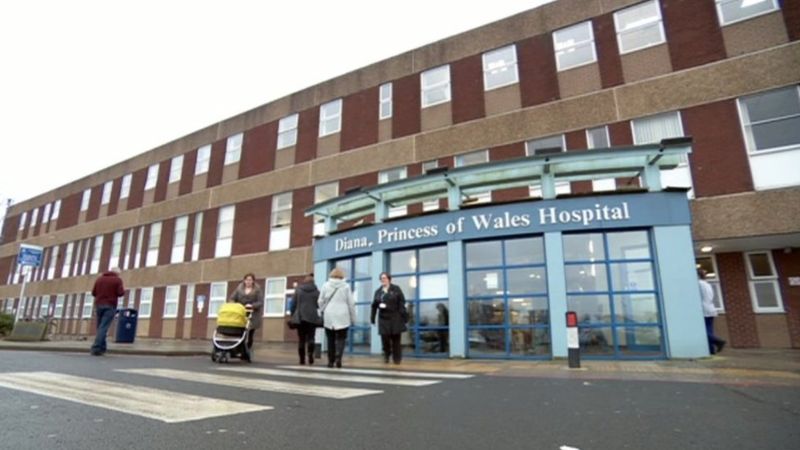Hospitals in the UK have canceled hundreds of operations due to a computer virus

Hospital them. Diana, Princess of Wales in the city of Grimsby in the northeast of Lincolnshire, one of the victims of computer virus infection
"On Sunday, October 30, our electronic systems infected the virus, and on the advice of experts, we decided to disable most of the systems in order to isolate and destroy it," this information message was published yesterday on the Northern Lincolnshire and Goole NHS Foundation Trust (NLAG) website, which operates three hospitals in small towns in the north and north-east of Lincolnshire, as well as in the East Riding of Yorkshire (United Kingdom).
Modern hospitals can hardly work without computers. Therefore, to date (Tuesday, November 1), all non-emergency (planned) surgeries, patient surgeries and diagnostic procedures have been canceled in hospitals. Cancellation is valid until special notice. All those who ask for help these days are sent to neighboring clinics.
The administration of the NLAG Foundation informed that the hospitalization of the patients is continued, and that those who have recovered are discharged from the clinic in a general manner. That is, the situation is not so critical: you can still get out of the clinic, and everything is under control in the hospital wards.
')
Resuscitation units that serve the ambulance calls continue to work. But they take patients only when absolutely necessary, that is, in emergency situations when a person’s life is in danger and he needs urgent help. In other cases, people are sent again to neighboring clinics.
Doctors do everything possible to help patients in difficult conditions. They observe the patients, assist them and carry out operations, if necessary. The maternity ward of the hospital and the chemotherapy room continue to work.
Three clinics of the NLAG foundation are designed for 850 beds. It remains to hope that until the end of the day no one will suffer because of this emergency.
Unfortunately, the trouble has affected not only NLAG. Yesterday it became known that in hospitals of another United Lincolnshire Hospitals NHS Trust (ULHT) fund, we also had to cancel planned operations . The facility manages four hospitals and ULHT uses clinical IT systems in conjunction with NLAG . The connection with these systems has been decided to temporarily suspend as a precaution.
ULHT has taken about the same measures. Scheduled procedures canceled. Emergency call operations and procedures are carried out only as a last resort if it threatens the patient’s life.
“We are acting according to plan to minimize the risks to patients. The plan includes a return to manual systems, ” said Mark Brassington, chief operating officer of ULHT. He explained that the biggest problem in the absence of computers is the processing of blood tests, access to the results of previous tests, and the availability of blood for transfusion.
Residents of cities with closed hospitals are advised to contact a pharmacist at the on-duty pharmacy or call the NHS 111 free medical consultation service, which helps all residents of England and Scotland, or contact general practitioners, some of whom work during out-of-school hours.
The cancellation of operations in several British hospitals is a clear demonstration of how vulnerable modern technocratic society is to computer threats. Perhaps this is only the first bell. If there are no special security measures taken in the field of medicine (for example, mass migration to more secure operating systems), we will hear about similar incidents more than once.
It’s hard to imagine how chaos and panic can arise if an attacker plans to carry out a targeted attack and inject viruses into the computer systems of many hospitals in the region at the same time. Apocalyptic scripts from science fiction films will then be partly translated into reality.
Security experts have long warned about the extremely depressing state of information security in health care. You can often see that the computers here are working on older versions of the unprotected Windows operating system, some computers are even connected to the Internet, and employees are allowed to connect USB drives. For this reason, the UK authorities are proposing to allocate £ 1.9 billion to the country's information security, updating outdated systems and protecting against cybercrime. The British Chancellor was going to present this plan just today, November 1st.
Where the current infection came from is still unknown. The local newspaper Grimsby Telegraph found out that hospitals are not required to pay the ransom. Probably, it was not the ransomware program that encrypts files on hard drives. Otherwise, critical clinical data, medical records and test results could be lost forever.
Perhaps the investigation of the incident will begin after you manage to remove the virus from all computers, and the hospitals will resume work in normal mode. Even if someone accidentally brought an infected flash drive to the workplace, he can be seriously charged in a criminal case. It is difficult to say how long the British courts give for this, but in Russia under article 293 of the Criminal Code “ Negligence ”, if negligence caused by negligence the infliction of grievous bodily harm or death of a person, it is envisaged up to five years in prison. In the case of the death of two or more people - up to seven years.
Source: https://habr.com/ru/post/357208/
All Articles